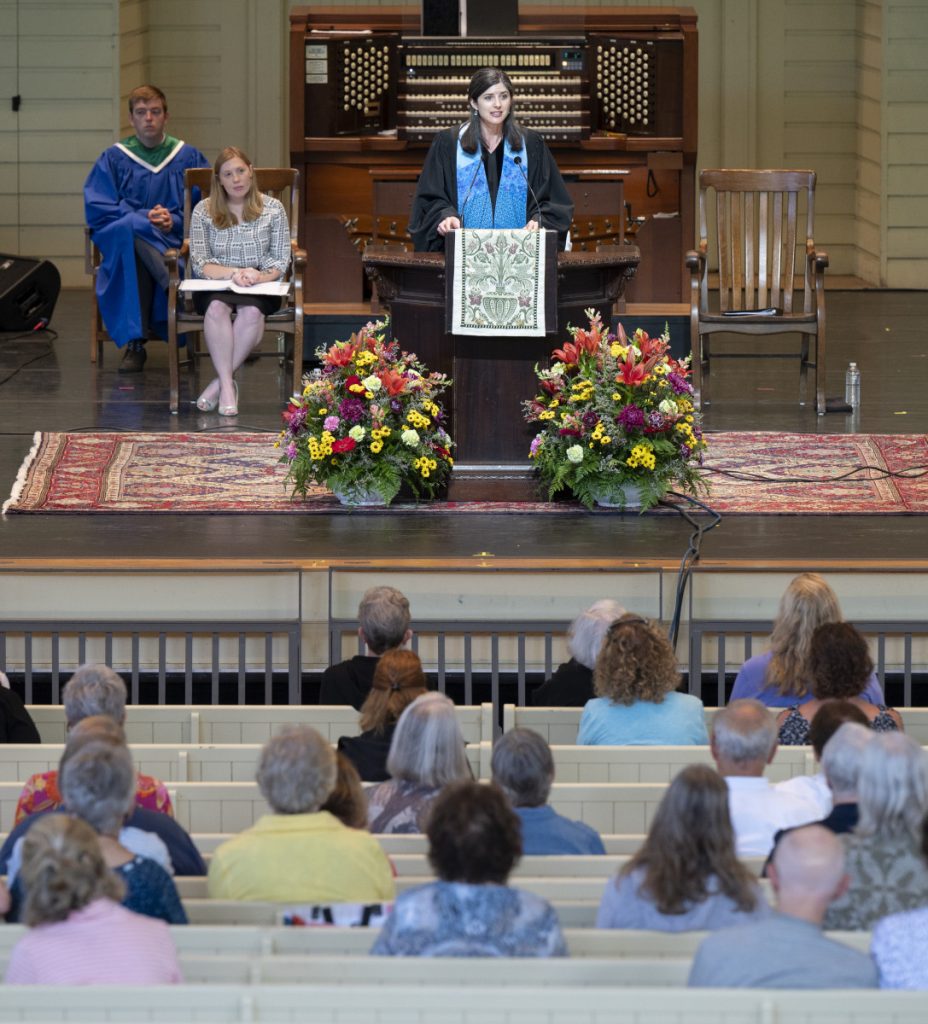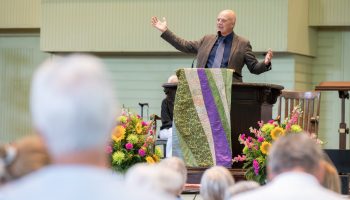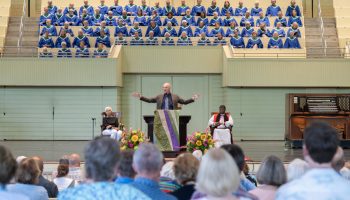MARY LEE TALBOT – STAFF WRITER

Solomon was wisdom’s rock star. “I imagine him like The Beatles in 1964, when ecstatic fans fainted when they took to the stage. All the nations flocked to be in Solomon’s presence,” said the Rev. Lynn Casteel Harper. She preached at the 9 a.m. Aug. 16 worship service in the Amphitheater. Her sermon title was “The Wisdom in Creating and Creation.” The Scripture text was 1 Kings 4:29-34.
“Wisdom that magnetic may strike us as strange today,” she told the congregation. “It may seem a bit humorous because our rock stars are known for their wealth, their appearances on jumbo screens or their athleticism, not wisdom.”
God’s wisdom transcended national borders, Harper said.
“Divine wisdom draws a big circle to bring people in, not keep them out,” she told the congregation. “There are Amphitheater seats for all who wish to enter. We know the failures of Solomon, but he left a legacy of a Biblical tradition on how to live wisely. He gave it content and shape.”
According to 1 Kings 4:32-33, Solomon composed 3,000 proverbs and 1,005 psalms. He wrote about cedars and hyssop, animals, birds, reptiles and fish.
“Through the use of poetry, music and the natural world, Solomon pulled together creation and the creative arts at the center of divine wisdom,” Harper said. “It was not military power, the economy, How to Win Friends and Influence People. It was the poetry of proverbs, sacred song and the beauty of nature that was central. Solomon was a composer, poet and naturalist.”
Divine wisdom lies in the imagination, she said, not in the memory.
“Our capacity to enjoy music, the scent of flowers, to love, abides and transcends the cognitive. When my grandfather was dying, we would sit and look at a pin oak. He had very few words and could not say or do much, but the beauty of the earth spoke in a way beyond words.”
Pastor and author Robert Davis wrote about his experience of Alzheimer’s in his book, My Journey into Alzheimer’s Disease. He noted that as his illness progressed, things that had given him spiritual comfort, like reading sermons or the Bible, became out of reach. He found joy in God’s creation and in the finely tuned balance of nature; he understood that God still knew his name.
“The visual arts, creative movement, music, touch, a place in the soul that is below the verbal and rational,” Harper said. “The jaw loosens, the breath slows and the heart lifts when we sing. When our capacity falls, the exact things in Solomon’s wisdom endure — poetry, songs and nature. The human heart longs for the imaginative and the noble.”
Harper said Chautauqua was the intersection of creation with the creating spirit, where the heart is enlarged and the soul awakened “so that we might imagine a just world where all thrive. It is our joy and responsibility to provide and protect access to the arts, no matter what your age or economic status. It is an affront to the divine when we desecrate the earth. Care for creating and the creation is holy work.”
She quoted a verse from “For the Beauty of the Earth,” which was the morning anthem: “For the beauty of the earth, / for the beauty of the skies, / for the love which from our birth / over and around us lies: / Lord of all, to thee we raise / this our joyful hymn of praise.”
Harper told the congregation, “You don’t have to be a self-described artist to be open to the wisdom of creativity and creation. You don’t have to travel far and wide or flock to a Solomon-like figure. Open your heart and eyes to what ‘over and around us lies.’ ”
The Rt. Rev. V. Gene Robinson, vice president of religion and senior pastor at Chautauqua Institution, presided. The Rev. Mary Lee Talbot, morning worship reporter for The Chautauquan Daily, read the Scripture. For the prelude, Joshua Stafford, Jared Jacobsen Chair for the Organist and director of sacred music, played “Adagio for Glass Harmonica,” by Wolfgang Amadeus Mozart. Members of the Motet Choir sang “For the Beauty of the Earth,” with music by John Rutter and words by Folliott Sanford Pierpont. The postlude was “Pieces for Musical Clock,” by Joseph Hayden, played by Stafford. This week’s services and chaplaincy are supported by The Edmund R. Robb-Walter C. Shaw Fund and the Randall-Hall Memorial Chaplaincy.




